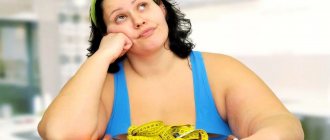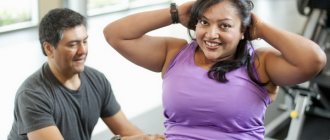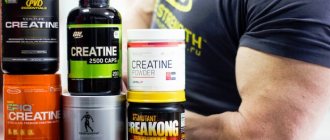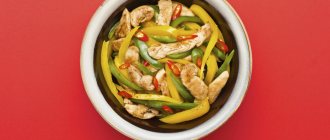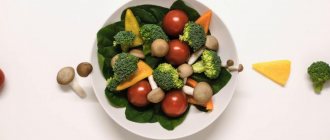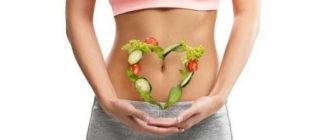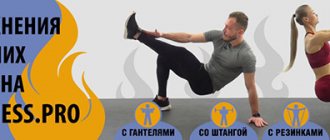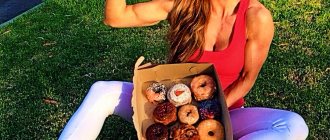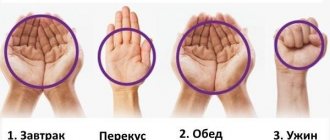Both healthy weight loss and weight gain are impossible without regular exercise. But even coaches insist that sport is about 30% of success. The remaining 70% is food. It is very important that the athlete’s menu and his training are correctly combined with each other. Nutrition when playing sports should be balanced, helping to saturate the body with all the necessary vitamins and minerals. Also, when creating a diet, you need to consider why you are working out: to lose weight, to gain weight, or just to stay in shape.
Proper nutrition and exercise: highlights
To achieve good results in sports, you need to observe the correct load during exercise, fully recover and, of course, eat properly. Proper nutrition when losing weight and playing sports should fulfill the following tasks:
- Activate and normalize metabolic processes in the body necessary for muscle growth and recovery.
- Saturate the body with all the necessary minerals and vitamins, provide sufficient calories.
- Adjust the weight depending on the goals of the trainee.
When performing exercises, the body uses a large amount of energy. Energy is needed to maintain the functioning of the heart, digestive and respiratory systems during exercise. If you eat poorly before training, your body may become exhausted, which will have an extremely negative impact on the athlete’s health. The menu should consist of fresh and nutritious foods.
The menu for how to eat when playing sports should be compiled individually, taking into account the age, weight, goals and objectives of the athlete, the characteristics and intensity of the load. However, there are also general principles. So, every meal should include a balanced ratio of proteins, fats and carbohydrates.
The optimal calculation formula for those involved in sports looks like this:
- 30-35% proteins
- 10-20% fat;
- 50-60% carbohydrates.
The optimal amount of protein in the diet when playing sports is 2-2.5 grams per kilogram of weight, fat - 0.5 g per kg of weight. Carbohydrates should be about 2 g per kg of weight if you want to lose weight, and 4-7 g per kg of weight if you need to gain. And before preparing for competitions and during the drying period, carbohydrates are reduced to 0.5-1 grams per kg of weight.
Let's look at what an approximate scheme would look like for men and women:
- If a man weighs 70 kg, then he needs 140 g of protein per day, 35 g of fat, and 210 g of carbohydrates to maintain weight, 280-490 g for weight gain and 140 g of carbohydrates. You can calculate the calories yourself, considering that a gram of protein and carbohydrates is equal to 4 kilocalories, and a gram of fat is 9 kcal. For example, to stay in the same weight category, an athlete weighing 70 kg needs about 2000 kcal.
- For a girl weighing 50 kg who wants to stay at the same weight, giving her muscles elasticity and correcting problem areas, she needs to eat about 60-80 grams of protein, 25 g of fat and 100-150 g of carbohydrates. When preparing meals for girls when playing sports to lose weight, we reduce the amount of carbohydrates accordingly.
It is recommended to eat in small portions, once every 3-4 hours. Thus, there will be 5-6 meals per day. Also, in how to eat properly when playing sports, you need to adhere to the following points:
- Of the 5-6 daily meals, three should be complete (breakfast, lunch and dinner), as well as 2-3 light snacks. This could be cottage cheese, fermented milk drinks, fruits, vegetables, etc.
- The serving size should be approximately the size of your palm.
- For breakfast, it is recommended to eat complex carbohydrates or a combination of carbohydrates and proteins.
- For lunch, it is not recommended to eat combinations such as meat (fish) with pasta (potatoes). The best option is cereals, protein foods and vegetables, especially if you still plan to visit the gym afterwards.
- It is better that the nutrition menu for losing weight while playing sports includes a protein dinner or a combination of proteins and vegetables. This will help the muscles recover after physical activity.
- On training days, you should absolutely not go hungry, as this can lead to exhaustion of the body and other negative consequences.
- Try not to eat in a hurry - this is the easiest way to consume prohibited foods. In addition, it is recommended not to eat from common dishes, but to put food on a plate - this will make it more convenient to control portion sizes.
- It is better to limit the amount of salt.
What to eat for weight loss
When choosing food for weight loss, the main principle is to consume less than you expend. With such a scheme, there is a danger of developing chronic diseases due to a constant lack of necessary elements. Vitamins, dietary supplements and sports nutrition come to the rescue.
Sports nutrition for weight loss involves taking fat-burning mixtures and protein.
After an evening workout, you should not eat carbohydrate foods. During the classes, exercises are selected to burn excess fat, that is, accumulated carbohydrates. And stopping this process by consuming carbohydrates in food means wasting time.
The exercises, duration, and number of repetitions are selected by the trainer, creating a weight loss program with you. These should be aerobic exercises to develop endurance - cycling, running, jumping rope, swimming. Weight-bearing exercises should use light weights with high repetitions.
To lose weight, it is necessary to keep a diary, taking into account the calories in foods and energy expenditure; you need to balance it every day.
List of products, menus and recipes
The list of products for weight loss is no different from the list for gaining weight. We must remember that the physiological norm of carbohydrate consumption for men and women is the same - 260-290 g/day. Women consume 12% less protein - 60-90 g/day. They consume 17% less fat – 60-100 g/day.
Sample menu for the day
- Breakfast: muesli with yogurt, natural coffee or green tea;
- Snack: apple, glass of kefir;
- Lunch: vegetable soup, vinaigrette, compote;
- Snack: protein shake;
- Dinner: boiled fish with cucumber, tea with honey.
Exercise and water
If you want to achieve results in sports, then it is important not only to eat properly, but also to drink enough water. We are talking specifically about water - not about coffee, not about tea, not about other drinks. Dehydration can not only negatively affect your workout results, but also harm your health. You can drink water before and after training. If you feel thirsty during class, you also need to drink some water.
Water helps prevent dehydration, gives the body the opportunity to replenish energy resources, protects the heart and blood vessels, improves the functioning of the digestive tract, cleanses the body, rejuvenates the skin and the entire body.
A person needs to drink at least two liters of water per day. It is useful to drink a glass on an empty stomach and 20 minutes before meals. But it is not recommended to drink food with water.
Nutrition during adaptive physical education has specific features associated with modern requirements of sports practice and nosology. These features are associated with the type of sport, various stages of preparation, direction, volume and intensity of training loads, individual differences, disease, recovery period, etc.
The magnitude of energy consumption during physical activity exercises is extremely varied and depends mainly not only on the type of activity, but also on the volume of work performed. It is now considered established that rational nutrition can only be achieved with a sufficient variety of foods and their correct combination.
The diet ensures optimal distribution of meals throughout the day. Rare and irregular meals impair digestion and contribute to the development of gastrointestinal diseases.
The distribution of the diet during the day depends on what time of day the main sports load occurs. If a training session or competition is held in the daytime (between breakfast and lunch), then breakfast should be predominantly carbohydrate-oriented, and also sufficiently high in calories (25% of the total calorie content of the daily diet), small in volume and easily digestible. You should not include foods high in fat and high in fiber. The timing of food intake should be constant - at the same time, it is better digested and absorbed. You cannot exercise on an empty stomach, or immediately after eating, since a full stomach limits the movement of the diaphragm, and this makes it difficult for the heart and lungs to work, which reduces performance. At the same time, muscle work worsens the functioning of the digestive organs.
Breaks between meals should not exceed 6 hours. Food should be taken 1-1.5 hours before training and 2-2.5 hours before competitions, and hot food should be taken 30-40 minutes after sports activities (intense muscle activity inhibits work digestive organs).
The physiological significance of lunch is to replenish the body’s various expenses during training sessions. The calorie content of lunch should be approximately 35% of the daily calorie content of food. Calorie content of dinner – 25%. The range of products should correspond to the restoration of tissue proteins and the replenishment of carbohydrate reserves in the body. It is advisable to include cottage cheese and products made from it, fish dishes, and porridge at dinner. You should not eat foods that linger in the stomach for a long time.
After dinner (before bed), it is recommended to drink a glass of kefir or yogurt, which are an additional source of proteins that help speed up recovery processes, and they also improve digestion; the microorganisms they contain inhibit the development of pathogenic and putrefactive microbes living in the intestines.
Food intake must be adapted to the AFC training regime so that at least 1.5 - 2 hours pass from the moment of the main meal to the training. This requirement mainly applies to sports involving large, long-term loads (skiing, torencourt, etc.). For sports related to speed and strength (sports and outdoor games), this time should be at least 3 hours.
Nutrition during ROS exercises should be varied and provide the body with all the necessary substances. One-sided nutrition, excessive use of meat, eggs and milk, does not justify itself, moreover, it can cause metabolic disorders and overload the body with certain metabolic products, which impede the functioning of the liver and kidneys. It is recommended to include in the diet sufficient quantities of vegetables and fruits, which are easily digestible and also supply the body with carbohydrates, minerals and some vitamins. You should also remember to supply the body with the necessary amount of polyunsaturated fatty acids .
The balance of food in terms of basic nutrients (nutrition formula) is usually expressed as the recommended ratio of nutrients in parts by weight and as a percentage of the calorie content of food:
· Proteins – 1 hour = 15%, including 55-70% complete protein.
· Fats - 0.7h = 25%, of which 1/3 is vegetable fats.
· Carbohydrates – 4h = 60%, 1/3 – simple (glucose, fructose).
· Vitamins: C = 35 mg, B = 0.8 mg, PP = 2 mg, A = 0.5 mg / 1000 kcal.
In the diet of those engaged in adaptive physical culture, protein and carbohydrate nutrition is organized, and the amount of fat is limited.
Calculation of the need for basic nutrients is made based on daily energy consumption and recommendations for the ratio of nutrients. For example, my daily energy expenditure is 4333 kcal, therefore:
· Calculation B = 4333*15%/100%=650 kcal, 162.5g (15%) – B, of which 130g is complete protein (70%).
· Calculation F = 4333*25%/100%=1083 kcal, 120g – F, of which 40g are vegetable fats (30%).
· Calculation Y = 4333*60%/100%=2500 kcal, 650g – Y, of which 215g are simple (30%).
· Calculation of vitamins: C = 151 mg, B = 3.4 mg, PP = 8.6 mg, A = 2.8 mg.
In order to avoid significant deviations in the vitamin status of those engaged in adaptive physical culture, in addition to rationalization of nutrition, it is certainly necessary to carry out additional vitamin supplementation in winter and spring.
There is a direct connection between the level of iron supply in the body and the level of physical performance. It is due to the importance of iron for oxygen transport in the blood and muscles, tissue respiration and oxidative phosphorylation. In those engaged in adaptive physical culture, as well as in athletes, adaptation to systematic loads, especially of an aerobic nature, may be accompanied by disturbances in iron metabolism, which entails the development of iron deficiency conditions (more often in women). Elimination of iron deficiency is facilitated by a diet enriched with meat products, vegetables, herbs, and fruits. Along with this, it is necessary to rationally use vegetables as a side dish for meat dishes and ascorbic acid, which effectively affects the absorption of iron. (S.N.Popov, 2004)
Nutrition before and after workouts
A weight loss plan for sports and nutrition should involve their harmonious combination with each other. You can only exercise on an empty stomach in the morning. In general, it is better to eat 1-1.5 hours before training. It is better if these are foods containing complex carbohydrates - this way you will get enough energy for training.
At the end of the workout, the so-called “protein-carbohydrate window” will open. If your goal is to build muscle mass, you can eat something protein-rich at this time, such as cottage cheese, or drink a protein shake. It is better to have a full meal approximately 1.5 hours after training. All these restrictions are not imposed on water - you can drink as much of it as you want, whenever you want.
We recommend that you learn more about how long after eating you can exercise
What to eat for weight gain
The formation of a healthy person depends on his principles of food consumption and physical activity. The science of nutrition is consistent with the laws of nature, which no one can violate. What a person looks like depends 80% on food and 20% on physical activity. Therefore, when regularly playing sports, it is necessary to choose the right composition of food. Eating right helps you gain muscle mass and burn fat while staying in good physical shape.
- We recommend reading: foods for weight gain
How many calories come in, so many need to be spent. This is the first law of proper nutrition. If you eat a lot, you will get fat. If you spend more than you consume, you will lose weight, and at the same time there will be a shortage of necessary substances.
To avoid extremes, you need to know the rules of nutrition during heavy physical activity in the gym or at work.
The second law of proper nutrition provides for the correspondence of the chemical composition of food to the physiological needs for nutritional and biologically active compounds. A person must receive 150 chemical compounds from food.
When gaining weight in men and occasionally in girls, it is recommended that carbohydrates predominate in the diet. Carbohydrates provide the body with energy from food. These are “slow” carbohydrates. Consumption of complex carbohydrates causes weight gain, consumption of protein foods causes muscle growth. Protein is fuel for muscles. First, the athlete gains weight, and then forms sculpted muscles. The more intense the physical activity, the more often the athlete eats.
The principles of proper food consumption are:
- Balance and presence of all necessary substances in food;
- Eat according to the schedule, at the same time;
- Eat little and often, meals should be 4 times a day, and preferably 5-6 times a day;
- Eat food one hour before training or two hours after it;
- Take the most high-calorie food at breakfast;
- Do not go beyond the permitted products until the final result is achieved;
- The amount of fat in food should not exceed physiological needs; they cannot be completely excluded from the diet.
The use of sports nutrition as a dietary supplement helps to obtain the necessary elements in their pure form. Calorie content is very easy to calculate by following the instructions for use.
To increase body weight, you need to take carbohydrate-protein mixtures classified as gainers.
Manufacturers and sellers of sports nutrition describe many advantages, and they really do have them:
- Serves as a source of nutrients, vitamins and microelements;
- Consumption increases energy during exercise;
- Metabolism increases significantly;
- Consumption reduces appetite;
- Helps increase muscle growth at a rapid rate.
Academician of the Russian Academy of Sciences, scientific director of the Institute of Nutrition Viktor Tutelyan believes that half of our health is the food we eat. Thanks to sports nutrition, the need for food has objectively decreased by 1500 kcal, but the necessary 150 elements remain. With normal eating, a deficiency of these elements occurs, and a person becomes ill with chronic diseases.
The most effective and simple way to replenish the body with microelements is the consumption of dietary supplements, that is, sports nutrition cocktails.
But there are effective principles of natural healing, developed by academician of medicine G. Shatalova, who saved many incurable patients in practice. These principles do not contain many rules:
- Food should be only natural and minimally processed,
- Do sports, exercise, stay in the sun more;
- Avoid nervous overload and frustration, engage in auto-training.
According to the academician, not a single artificial molecule can be absorbed to benefit the body. The choice of food composition is ours - it is only our health.
List of products, menus and recipes
Proper nutrition during physical activity should be based on the consumption of foods containing slow carbohydrates. The menu should include:
- Cereals and porridges (buckwheat, oatmeal, millet, but not semolina);
- Whole wheat pasta;
- Legumes (beans, lentils, peas, chickpeas);
- Low-fat protein foods (skim milk, cottage cheese, natural yogurt);
- Eggs;
- Lean meat (veal, turkey, chicken);
- Lean fish.
Products consumed in limited quantities:
- Cabbage;
- Zucchini;
- Greens (onion, parsley, dill, lettuce, spinach);
- Pepper;
- Tomatoes;
- Nuts, dried fruits.
- Unsweetened fruits (grapefruit, apples, kiwi), consumed before lunch;
- Berries;
- Mushrooms.
Prohibited products:
- Sweets;
- Alcohol;
- Spicy foods;
- Smoked and salted dishes;
- Sweet fruits.
This menu, in fact, is therapeutic; it is necessary for diseases of the endocrine system, and normalizes deviations in the functioning of the endocrine glands. When drawing up a menu, it is worth considering that at breakfast they eat food rich in slow carbohydrates, for lunch they eat protein-carbohydrate dishes, and for dinner they should only eat protein foods.
- Conclusions: you should have porridge for breakfast, meat and vegetables for lunch, and cottage cheese for dinner.
Sample menu for the day
- Breakfast: 150 grams of oatmeal porridge with 2 tsp. berries or fruits, 1 tsp. honey;
- Snack: 10 nuts;
- Lunch: 150 grams of buckwheat porridge with 150 grams of vegetables, 1 tsp. vegetable oil, 1 egg;
- Snack: 100 grams of 1% cottage cheese or sports shake;
- Dinner: 150 grams of boiled meat or chickpeas, 1 tbsp. kefir
You should have dinner before 18 o'clock, since after this time the pancreas is physiologically switched off and must be at rest, not producing secretions for digesting food. There are no recipes as such, since all products are prepared as simply as possible - steamed and without spices.
What to eat when playing sports
Not everyone knows what to eat if you play sports. In fact, the body’s need for nutritional components in this case is increased. Let's look at what nutrients an athlete needs.
Proteins are the main building material for muscles, and their quantity, as we have already said, should be at least 2-2.5 g per kg of weight. Their main sources are lean meat and fish, cheese, peas and beans, eggs, cottage cheese. Of the total amount of proteins, approximately half should be of animal origin, and the other half should be of plant origin.
Carbohydrates are the main source of energy, so it is also important that the amount is correct. Carbohydrates are divided into complex and simple. You need to focus on the complex ones, as they provide long-lasting energy. Their sources are cereals, pasta, beans, peas, and vegetables. Simple carbohydrates should be no more than 35%. Their sources are fruits, honey, sugar, sweets.
It is also important not to give up fat. This is especially important with proper nutrition for girls involved in sports, since the female body suffers greatly from a lack of fat. It is recommended to focus on vegetable fats, which are found in nuts, avocados, and vegetable oils. Sea fish is also a useful source.
Another point is that with intense exercise, the need for mineral components such as phosphorus and calcium . Their ratio in the diet should be 1.5:1. If this ratio is violated, phosphorus is poorly absorbed, which can provoke a number of troubles, since phosphorus compounds determine the speed of reaction and muscle work, which requires serious nervous tension.
The best sources of phosphorus are meat, fish, cottage cheese, milk, cheese, carrots, onions, buckwheat, wheat and oatmeal, beans, peas, lentils, soybeans.
Large amounts of calcium are found in dairy products, legumes, and canned fish.
It is also important that the athlete’s body receives the right amount of vitamins. This helps increase the body's endurance and speed up its recovery after exercise. To get enough vitamins, try to eat fruits and vegetables. During the winter, you can take vitamin and mineral supplements. Some of them are intended specifically for athletes, but it is recommended to consult a specialist before taking them.
The list of the most useful products for athletes includes the following:
- buckwheat;
- oatmeal - better not instant;
- boiled chicken, turkey, beef, rabbit;
- Fish and seafood;
- cottage cheese with fat content up to 5%;
- milk with fat content up to 2.5%;
- natural yogurt without additives (it can also be made at home using yogurt starter);
- vegetables, fruits, herbs;
- vegetable oils;
- nuts;
- dried fruits.
There are also foods that are best avoided by a person who wants to achieve results in sports, or at least minimize them. These include sugar, sugar-containing products, sweets, baked goods, smoked products, canned food, fast food, and carbonated water. It is recommended to minimize or avoid alcohol consumption.
If you love sweets and find it hard to give them up, try to choose healthy sources, for example, honey, marmalade, marshmallows, and marshmallows. It is recommended to consume them in the first half of the day in small quantities.
The role of fluids and fats in proper nutrition
Sufficient amounts of water and other healthy drinks are essential for an active lifestyle. The body must replenish the fluid lost during training. You need to drink about two liters of water per day, although everything is individual: its volume is determined by energy costs. In order to make sure that the body has enough fluid, you need to look at the urine. If it is dark yellow, then it is necessary to increase the amount of drinks consumed.
It is generally accepted that a diet involves a complete rejection of foods containing a sufficient amount of fat. However, this is not quite true. If a person plays sports, then he needs fats. Participating in a complex mechanism, they take part in the fight against excess weight, in particular, they slow down the release of insulin, which transports glucose into subcutaneous fat. Thus, proper consumption of fats helps to reduce the volume of the abdomen and buttocks.
The body needs fats such as omega-3 and omega-6, which are rich in fish and various seafood. Fish can be eaten in any form, but it is best to steam or boil it. Animal fats are also useful, as they are necessary for the absorption of vitamins. Your daily diet should include vegetable oils and a small amount of butter for breakfast. Margarine and transgenic fats should be abandoned, since their use is only harmful.
Proper nutrition for weight loss while playing sports: menu
The nutrition menu for sports for a girl or guy should be calculated individually, taking into account gender, weight, goals, and so on. To get an idea of what it might be, let’s consider an approximate version of it:
- Breakfast: 150 g of oatmeal cooked in water, 100 grams of fruit, 10 nuts, a teaspoon of honey.
- Snack: whole grain bread with a slice of cheese, tea without sugar.
- Lunch: 100 grams of buckwheat, boiled egg, 150 grams of vegetables and herbs seasoned with vegetable oil.
- Snack: 100 grams of low-fat cottage cheese.
- Dinner: 100 grams of baked or boiled meat.
Proper nutrition is very important with regular physical activity. What happens if you eat and exercise? If you do the right things, you will achieve amazing results. Remember that your success largely depends on the menu, and try to plan it correctly.
How much fat, protein and carbohydrates are needed for a proper diet?
In addition to counting calories, proper nutrition during strength training should also take into account the composition of foods.
When playing sports, you need to include the required amount of proteins, fats and carbohydrates in your diet. Their ratio is adjusted depending on the type of training.
To build muscle, increase your daily protein intake (meat, cottage cheese, eggs, legumes):
- for women – from 100 grams per day;
- for men – from 200 grams per day.
Throughout the day, it should be present in the diet. If it is not possible to eat such an amount of protein food per day, athletes resort to consuming protein shakes.
To replenish lost energy, you need to consume carbohydrates. For proper nutrition, you can completely dedicate breakfast to carbohydrates. For this, breakfast consists of:
- croup;
- whole grain bread;
- durum wheat pasta.
Light carbohydrates such as sweets and baked goods should be completely excluded.
Fats control the body's metabolic process. At the same time, the quality of the product must be appropriate. Should be preferred:
- unrefined oils;
- red fish;
- nuts and seeds.
Still, you shouldn’t get carried away with them; the norm for fat consumption per day is 30-40 grams.
It is also necessary to follow a gym diet at home if you miss several classes. This will help consolidate the result and prevent the opposite effect.
Monitoring the coherence of processes within the body also involves maintaining nutrition during training in the gym. When changing your food intake, it is necessary to monitor blood sugar levels and regulate the amount of important amino acids, microelements and vitamins in food.
Regular and proper nutrition during training will help prevent unpleasant consequences for health and ensure its smooth functioning.
